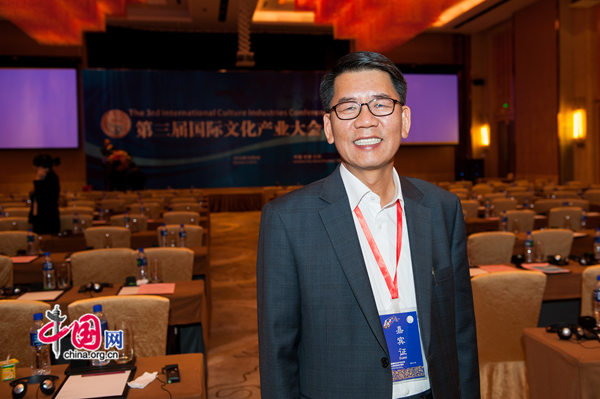Korea 'not irrelevant' to Silk Road
- By Chen Boyuan
 0 Comment(s)
0 Comment(s) Print
Print E-mail China.org.cn, October 11, 2014
E-mail China.org.cn, October 11, 2014
Few people understand that the ancient Silk Road once benefited Korea, as most people take it for granted that the ancient passageway only ran through China, while Korea, which lies further to the east, was not part of the ancient route.
 |
|
Song Jungsok [Photo by Chen Boyuan / China.org.cn] |
But Song Jungsok, the Beijing chief of the Korea Foundation, has confirmed that Korea was positively influenced by the ancient Silk Road.
"Historically, Korean people came to China during the era of Silla (57 B.C. – 935 A.D.) At that time, Koreans had communications with the Europeans and central Asians who came to China on the Silk Road," said Song on Thursday, Oct. 9, 2014, while attending the 3rd International Culture Industry Conference in Lanzhou. The conference was a joint effort of the Gansu provincial government and the Asia-Pacific Association.
Explaining how the Silk Road was "not irrelevant" to Korea, Song also added that apart from these people-to-people exchanges, south and central Asian cultures, especially those of India, sent delegations that "sailed to Korea after reaching China on the ancient Silk Road."
While the ancient Silk Road benefited Korea, albeit in an indirect way, Song said he believes the new Silk Road Economic Belt, a recently-developed strategic concept to revive the ancient route, would not leave South Korea behind.
"South Korea has very close ties with many Chinese cities, such as Beijing, Shanghai and Qingdao. However, our ties with Gansu, among other places in west China, are not as close," said Song. He made a point to refer to a Korean art exhibition he brought to Lanzhou on the sidelines of the culture industry summit, which in part echoes the Korea Foundation's mission to promote international understanding of Korea through various exchanges.
Song said that the Korean art exhibition, which has previously been displayed at the avant-garde 798 Art Zone in Beijing, is a "cultural bridge" between the two countries. In the larger picture, according to Song, cultural exchanges such as this can build a closer "cultural bond" between South Korea and Lanzhou, as well as other cities in central and western China, which may naturally boost economic ties, although economic relationships are not specifically part of the Korea Foundation's goals.






Go to Forum >>0 Comment(s)